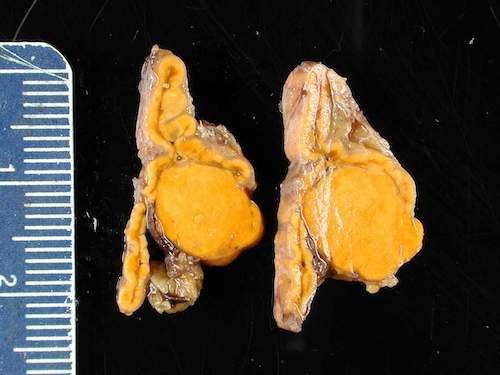Endocrine: Hyperaldosteronism
Primary Hyperaldosteronism (Conn Syndrome)
Definition
- Definition: Hypersecretion of Aldosterone from the Adrenal Gland
Causes
- Bilateral Hyperplasia (60-70% – Most Common)
- Unilateral Adenoma (30-40%)
- *Adenomas Generally Have Higher Aldosterone Secretion Rates with More Severe Hypertension & Hypokalemia than in Hyperplasia
- Rare Causes:
- Unilateral Hyperplasia
- Familial Hyperaldosteronism
- Aldosterone-Producing Adrenocortical Carcinoma
Presentation
- Classic Presentation: Hypertension & Hypokalemia
- Hypertension – Often Refractory to Medical Treatment
- Hypokalemia – Caused by Hypersecretion of Aldosterone & Sodium Reabsorption in the Distal Tubules
- Frequently Normal in Modern Practice (Only Present in 9-37%)
- Metabolic Alkalosis – From Hypersecretion of Aldosterone & Urinary Hydrogen Excretion in Exchange for Potassium
- Mild Hypernatremia (143-147 mEq/L)
- Muscle Weakness
- Increased Cardiovascular Morbidity & Mortality
- Increased GFR – May Decrease After Adrenalectomy

Adrenal Adenoma Causing Conn Syndrome 1
Indications for Screening
- Hypertension & Hypokalemia (Spontaneous or Diuretic-Induced)
- Hypertension that is Severe (SBP > 150-160 mmHg or DBP > 100 mmHg)
- Hypertension that is Drug-Resistant (Uncontrolled on a 3-Drug Regimen)
- Hypertension & Adrenal Incidentaloma
- Hypertension & Sleep Apnea
- Hypertension & Atrial Fibrillation
- Hypertension & Family history of Early-Onset Hypertension or CVA at Age < 40 Years
- First-Degree Relative with Primary Hyperaldosteronism
Diagnosis
- Initial Screening Test: Aldosterone:Renin Ratio > 20-30
- Ratio Uses Plasma Aldosterone Concentration & Plasma Renin Activity (Not Concentration)
- Normal Ratio: 4-10
- Some Prefer to Use the Paired Random Labs:
- Plasma Aldosterone Concentration/PAC (≥ 10 ng/dL or ≥ 277 pmol/L)
- Plasma Renin Concentration/PRC (Below Lower Limit) or Plasma Renin Activity/PRA (< 1.0 ng/mL/hr)
- Must First Stop All Interfering Medications for 4-6 Weeks:
- Mineralocorticoid Receptor Antagonists (Spironolactone & Eplerenone)
- ACE Inhibitors, ARBs & Direct Renin Inhibitors
- *Beta-Blockers Do Not Need to Be Held – Although they Do Lower PRA & PRC & Increase PAC/PRA Ratio it is Not Clinically Important & May Have Risks with Discontinuation
- Ratio Uses Plasma Aldosterone Concentration & Plasma Renin Activity (Not Concentration)
- Diagnostic Confirmation Test: Oral Sodium-Load Suppression Test
- Exception That Does Not Require Diagnostic Confirmation (Requires All 3):
- Spontaneous Hypokalemia
- Low Renin (PRC or PRA)
- PAC ≥ 20 ng/dL
- Oral Sodium-Load Suppression Test
- High Sodium Diet (5000 mg) Given for 3 Days
- Then Measure 24-Hour Urine Sodium & Aldosterone
- Urine Sodium > 200 mg Confirms Adequate Loading
- Urine Aldosterone > 12 mcg Confirms Diagnosis
- Other Confirmatory Tests:
- Saline Infusion Suppression Test
- Fludrocortisone Suppression Test
- Exception That Does Not Require Diagnostic Confirmation (Requires All 3):
Localization
- Localization: Adrenal CT
- Findings:
- Hyperplasia – Bilateral Thickening or Micronodular (< 1 cm) Changes
- Adenoma – Solitary Hypodense Macroadenoma (> 1 cm) with Normal Contralateral Gland
- Aldosteronomas are Typically Small (< 2.0 cm)
- Carcinoma – Large (> 4-6 cm)
- Findings:
- Adrenal Vein Sampling (AVS)
- Gold Standard for Differentiation of Adenoma vs Hyperplasia but More Invasive
- Measures Aldosterone Directly from the Adrenal Veins
- Indications:
- Bilateral Nodularity
- Unilateral Nodule < 1 cm
- Normal CT Findings
- Age > 35-45
- Findings:
- Bilateral Aldosterone Elevation: Hyperplasia
- Unilateral Aldosterone Elevation: Adenoma
Treatment
- Bilateral Hyperplasia: Medical Therapy (Sodium Restriction & Antihypertensives)
- Antihypertensives:
- First Choice: Mineralocorticoid Receptor Antagonists (Spironolactone & Eplerenone)
- If Persistent: Add Hydrochlorothiazide or ACE Inhibitors
- Consider Other Potassium-Sparing Diuretics (Amiloride or Triamterene) if Intolerant of Both Mineralocorticoid Receptor Antagonists
- May Consider “Debulking” Unilateral or Subtotal Adrenalectomy if Medical Management Fails (Usually for Refractory Hypokalemia)
- Antihypertensives:
- Unilateral Disease (Adenoma or Hyperplasia): Laparoscopic Adrenalectomy
- *See Endocrine: Adrenalectomy
- Open (Anterior) Approach if Large > 6-7 cm
Secondary Hyperaldosteronism
Definition
- Definition: Hypersecretion of Aldosterone Due to Extra-Adrenal Stimuli
- More Common Than Primary
Causes
- Reduced Renal Perfusion:
- CHF
- Renal Artery Stenosis
- Cirrhosis
- Dehydration
- Medications (Diuretics or Vasodilators)
- Renin-Secreting Tumor
- Bartter Syndrome – Genetic Disorder of Salt Reabsorption with Fluid Depletion & Low-Normal Blood Pressure Causing RAAS Stimulation
Presentation
- Similar to Primary Hyperaldosteronism
Diagnosis
- High Aldosterone
- High Renin (Low in Primary Hyperaldosteronism)
Treatment
- Primary Treatment: Treat Underlying Cause
- May Add Mineralocorticoid Receptor Antagonists (Spironolactone & Eplerenone) if Needed
References
- Feldman M. Wikimedia Commons. (License: CC BY-2.0)